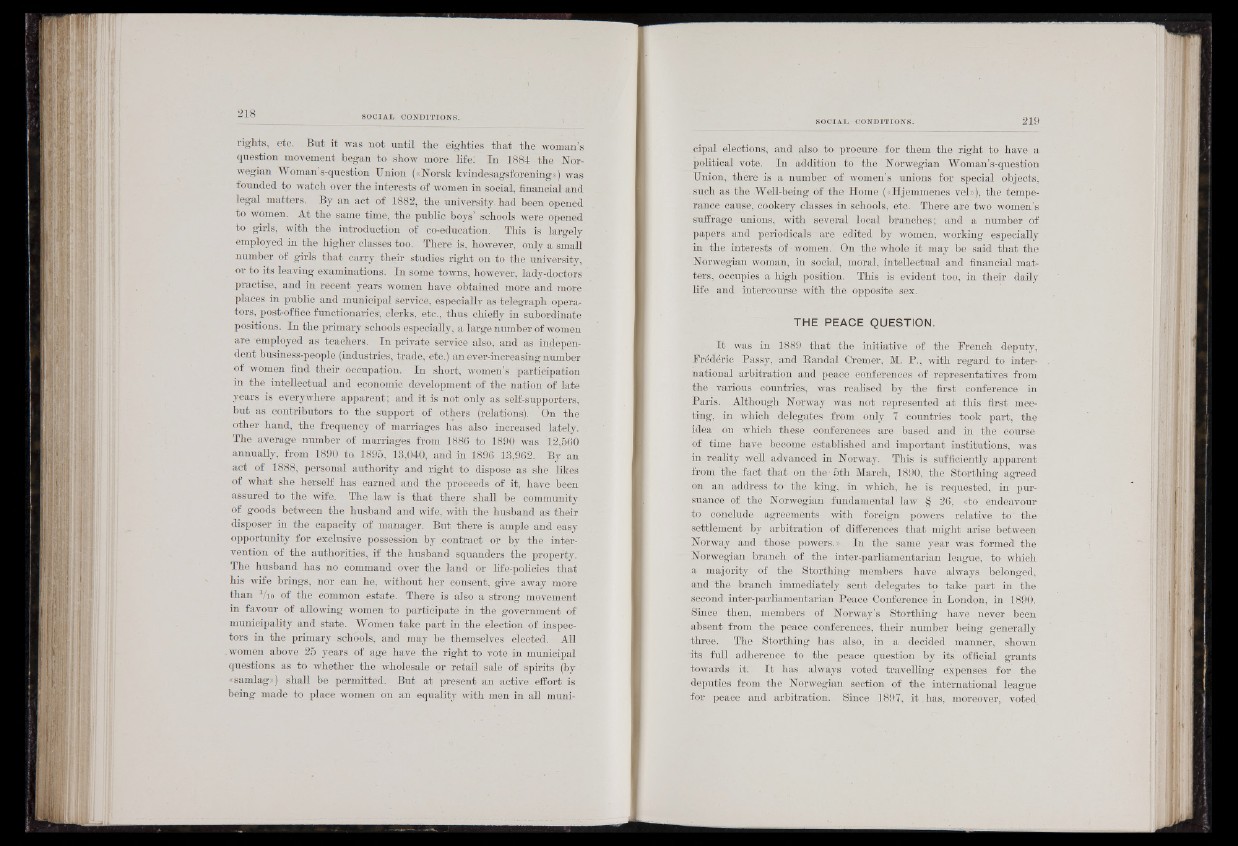
rights, etc. But it was not until the eighties that the woman’s
question movement began to show more life! In 1884 the Norwegian
Woman s-question Union («Norsk kvindesagsforening») was
founded to watch over the interests of women in social, financial and
legal matters. By an act of 1882, the university had been opened
to women. At the same time, the public boys’ schools were opened
to girls, with the introduction of co-education. This is largely
employed in the higher classes too. There is, however, only a small
number of girls that carry their studies right on to the university,
or to its leaving examinations. In some towns, however, lady-doctors
practise, and in recent years women have obtained more and more
places in public and municipal service, especially as telegraph operators,
post-office functionaries, clerks, etc., thus chiefly in subordinate
positions. In the primary schools especially, a large number of women
are employed as teachers. In private service also, and as independent
business-people (industries, trade, etc.) an ever-increasing number
of women find their occupation. In short, women’s participation
in the intellectual and economic development of the nation of late
years is everywhere apparent; and it is not only as self-supporters,
but as contributors to the support of others (relations). On the
other hand, the frequency of marriages has also increased lately.
The average number of marriages from 1886 to 1890 was 12,560
annually, from 1890 to 1895, 13,040, .and in 1896 13,962. By an
act of 1888, personal authority and right to dispose as she likes
of what she herself has earned and the proceeds of it, have been
assured to the wife. The law is that there shall be community
of goods between the husband and wife, with the husband as their
disposer in the capacity of manager. But there is ample and easy
opportunity for exclusive possession by .contract or by the intervention
of the authorities, if the husband squanders the property.
The husband has no command over the land or life-policies that
his wife brings, nor can he, without her consent, give away more
than Vio of the common estate. There is also a strong movement
in favour of allowing women to participate in the government of
municipality and state. Women take part in the election of inspectors
in the primary schools, and may be themselves elected. All
women above 25 years of age have the right to vote in municipal
questions as to whether the wholesale or retail sale of spirits (by
«samlag») shall be permitted. But at present an active effort is
being made to place women on an equality with men in all municipal
elections, and also to procure, for them the right to have a
political vote. In addition to the Norwegian Woman’s-question
Union, there is a number of women’s unions for special objects,
such as the Well-being of the Home («Hjemmenes vel»), the temperance
cause, cookery classes in schools, etc. There are two women’s
suffrage unions, with several local branches; and a number of
papers and periodicals are edited by women, working especially
in the interests of-women." On the whole it may be said that the
Norwegian woman, in social, moral, intellectual and financial matters,
occupies a high position- This is evident too, in their daily
life and intercourse with the opposite sex.
THE PEACE QUESTION.
I t was in 1889 that the initiative of the Trench deputy,
.Frederic Passypand Randal Qremer, M. P., with regard to international
arbitration and peace conferences of representatives from
the various countries, was realised by the first conference in
Paris. Although Norway was not represented at this first meeting,
in which delegates from only 7 'countries took part, the
idea on which these conferences are based and in the course
of time have become established and important institutions, was
in reality well advanced in Norway. This is sufficiently apparent
from the fact that on the- 5th March, 1890, the Storthing agreed
on an address to the king, in which, he is requested, in pursuance
of the Norwegian fundamental law § 26, «to endeavour
to conclude agreements with foreign powers relative to the
settlement by arbitration of differences that might arise between
Norway and those powers.» In the same year was formed the
Norwegian branch of the inter-parliamentarian league, to which
a majority of the Storthing members have always belonged,
and the branch immediately^ sent delegates to take part in the
second inter-parliamentarian Peace Conference in London, in 1890.
Since then, members of Norway’s Storthing' have never been
absent from the peace conferences, their number being generally
three. The Storthing has also, in a decided manner, shown
its full adherence to the peace question by its official grants
towards it. I t has always voted travelling expenses . for the
deputies from the Norwegian section of the international league
for peace and arbitration. Since 1897, it .has, moreover, voted